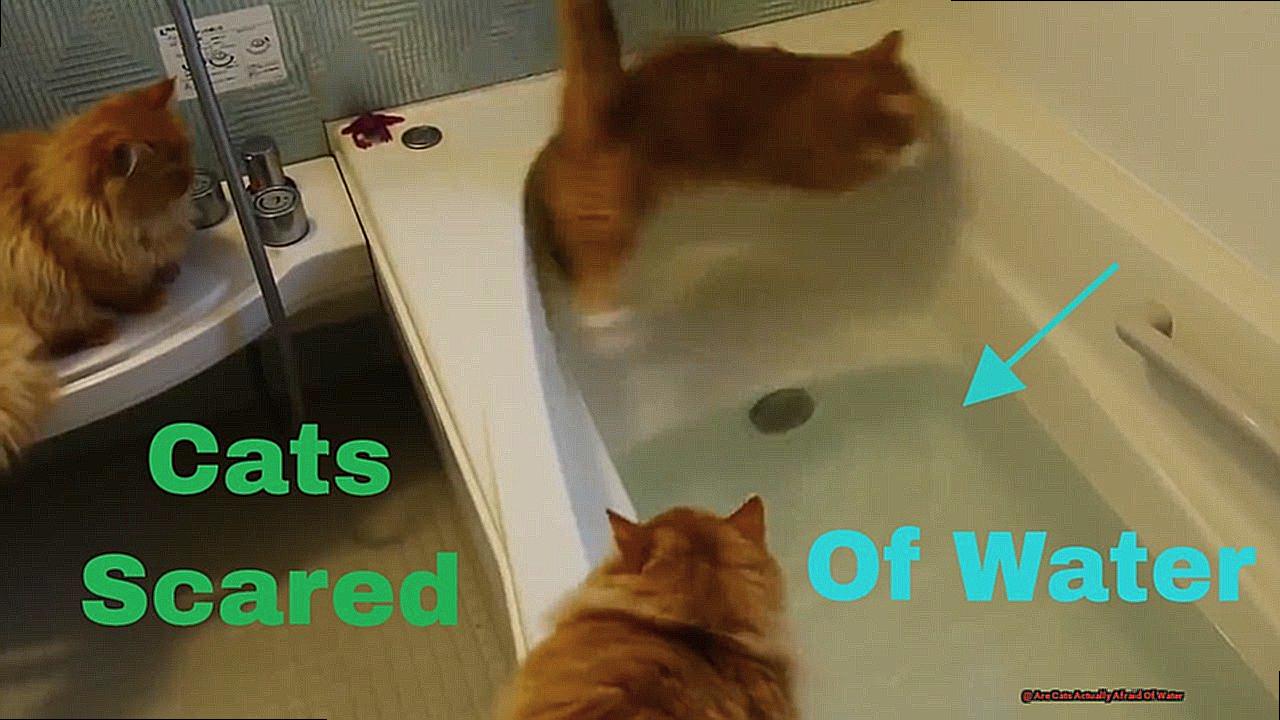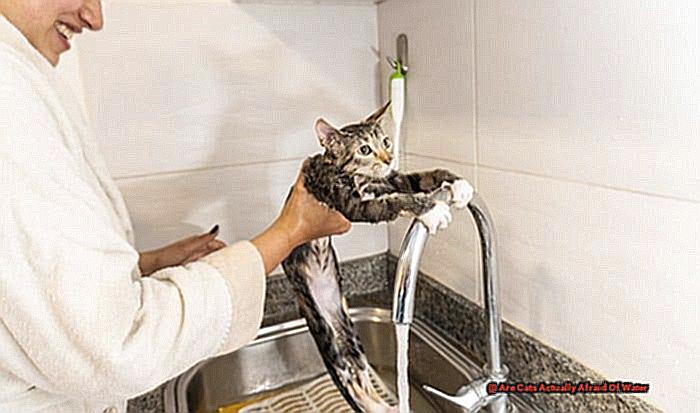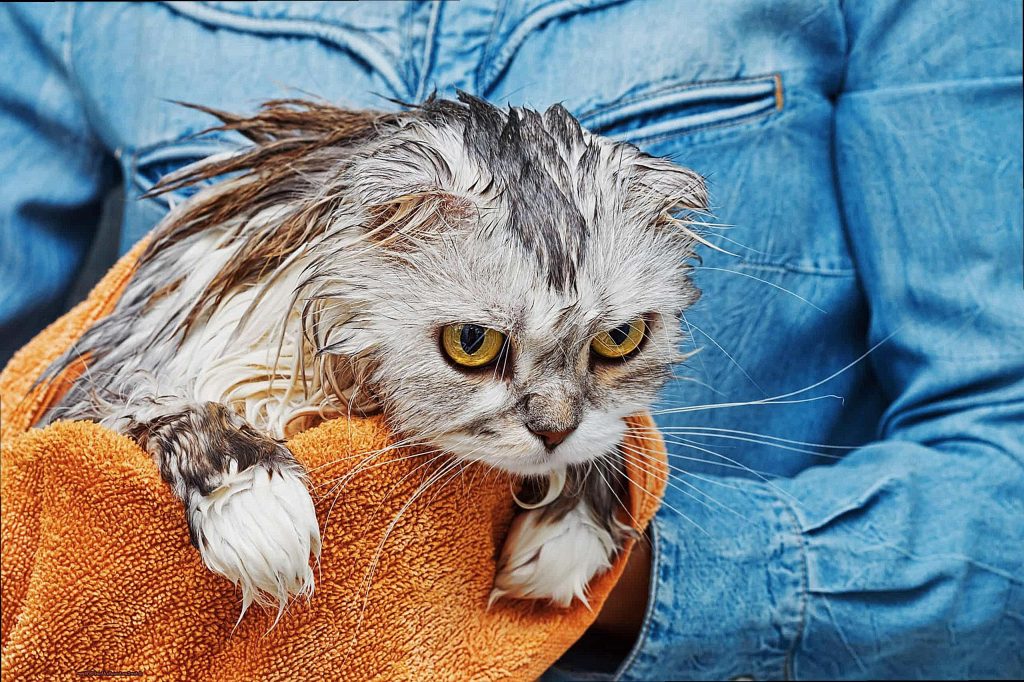There’s one thing that seems to send these creatures running for the hills: water.
Whether it’s a drop from the faucet or a full-blown bath, most cats will do anything to avoid getting wet. But why?
Is it just a matter of personal preference or is there more to this fear of water? In this blog post, we’ll unravel the truth behind cats and their aversion to H2O.
So snuggle up with your feline friend and let’s uncover the mystery of why cats seem to be afraid of water.
Are Cats Actually Afraid Of Water?
Contents
If you’re a cat owner, you’ve probably noticed that your furry friend has a strong aversion to water. From running away at the sight of a bath to frantically shaking their paws after accidentally stepping in a puddle, cats seem to have an innate fear of water. But have you ever wondered why?
As an expert on all things feline, I’m here to shed some light on this mysterious behavior and provide some insights into why cats are afraid of water. So, let’s dive in (pun intended).
Instinctual Behavior:
Cats are natural predators with keen instincts for survival. In the wild, they rely on their quick reflexes and agility to hunt and escape danger. Water can hinder these abilities, making cats feel vulnerable and uneasy. This instinctual fear of water is likely passed down from their wild ancestors who did not have to encounter large bodies of water.
Lack of Exposure:
Another reason for cats’ fear of water could be due to their lack of exposure during their early development stages. Kittens that are not introduced to water at a young age may develop a fear of it later in life. This is because they are more likely to see it as a threat rather than something to explore and play with.
Traumatic Experiences:
Just like humans, cats can also develop fears based on past experiences. If your cat has had a negative encounter with water, such as being forced into a bath or getting sprayed with water, this could contribute to their fear. These negative experiences can create lasting impressions and make cats avoid water altogether.
Individual Preferences:
It’s essential to remember that not all cats are afraid of water due to their instincts or past experiences. Some cats may simply not like the sensation of getting wet. Cats are known for their cleanliness and grooming habits, and getting wet disrupts their natural routine. Additionally, older cats may develop a fear of water due to age-related factors such as arthritis or joint pain.
As cat owners, it’s essential to understand our furry friend’s individual preferences and fears. If you notice that your cat has a fear of water, it’s best not to force them into any activities involving it. Instead, try slowly introducing them to small amounts of water in a controlled environment and using positive reinforcement techniques.
The Myth of Cats Being Afraid of Water
Let’s get one thing straight – cats are not afraid of water. I repeat, cats are not afraid of water. This common misconception has been perpetuated for far too long, and it’s time to set the record straight. As an expert on all things feline, I’m here to debunk this myth and give you the inside scoop on why your cat may seem averse to water.
First off, let’s address the origins of this belief. Many people assume that cats are afraid of water because they do not typically enjoy getting wet. While this may be true for some cats, it does not mean that all cats are inherently scared of water. In fact, many cats actually enjoy playing with water. Whether it’s drinking from a dripping faucet or chasing after droplets from a spray bottle, our feline friends can be quite fascinated by water.
But why do some cats seem so averse to water? Well, it all comes down to their natural instincts. Cats are known for their cautious and curious nature, and anything new or unfamiliar can trigger their survival instincts. Water is no exception – it’s a foreign element that they may not have encountered in the wild. However, with proper socialization and exposure, many cats can overcome this initial aversion and even learn to enjoy activities like swimming or playing in shallow pools.
Another factor that may contribute to the myth of cats being afraid of water is past negative experiences. If a cat has been accidentally sprayed with water as a form of punishment by their owner, they may develop a fear or aversion to it. It’s important for pet owners to understand that every cat is unique and may have different preferences when it comes to water. Just because one cat may not enjoy getting wet, doesn’t mean all cats share the same sentiment.
In fact, many experts argue that cats are actually quite skilled swimmers and have been depicted in ancient Egyptian art as being associated with water. So the idea of cats being afraid of water is not only a myth, but it’s also a disservice to our feline friends who are actually quite capable and even enjoy interacting with water.
Breed Variations: Cats Who Love Water
As a cat owner, you may have been told countless times that cats are afraid of water. But as an expert on feline behavior, I’m here to tell you that this is simply not true. In fact, there are certain cat breeds that have a natural affinity for water. Let’s take a closer look at why cats like Turkish Vans, Maine Coons, and Bengals love to make a splash.
Thick Coats and Water Resistance
Turkish Vans, known as the “swimming cats,” have water-resistant fur that helps them stay warm and buoyant while swimming. Similarly, Maine Coons, with their ancestors being farm cats, have a thick coat that is also water-resistant. This attribute comes in handy when they need to swim to catch fish. Bengal cats, with their wild ancestry from Asian leopard cats, also have a dense and water-resistant coat.
Ancestral Roots
Speaking of ancestry, it is believed that these breeds have a natural instinct for water due to their ancestors’ history. Turkish Vans originated in Turkey and were known for their love of swimming in the country’s lakes and rivers. Maine Coons were farm cats that needed to swim to catch fish for their owners. And Bengal cats, with their wild roots, had to adapt to their natural habitat, which often included bodies of water.
Playful Personalities
Aside from their thick coats and ancestral roots, these cat breeds also have playful personalities that contribute to their love for water. They may enjoy playing with running water from faucets or even taking showers or baths with their owners. This adds a fun and interactive element to their relationship with water.
Not All Cats Are the Same
While these breeds have a predisposition towards enjoying water, it’s important to remember that each individual cat has its own personality and preferences. Just like humans, some cats may love water while others may not. It’s all about finding what your cat enjoys and respecting their boundaries.
Early Experiences: How They Shape a Cat’s Relationship with Water
Cats are often portrayed as creatures who have an innate fear of water. However, this is not always the case. Just like humans, cats’ early experiences can greatly influence their relationship with water. In fact, experts suggest that these experiences play a crucial role in shaping how comfortable a cat is with water later in life.
To understand this better, let’s take a look at how a cat’s early interactions with water can impact their relationship with it.
Introduction to Water: The Motherly Touch
Kittens are usually introduced to water by their mothers during grooming sessions. This is a gentle and positive way for kittens to first experience water. It also helps them associate water with something soothing and nurturing.
Additionally, some breeds such as the Turkish Van and Bengal cats have a natural affinity for water due to their ancestors living in areas with bodies of water. This could also influence a kitten’s comfort level with water from a young age.
Human Influence: A Bathing Experience
Humans also play a role in a kitten’s early experiences with water. Many kittens are bathed by humans when they are still young. If done in a gentle and positive manner, this can help kittens become more comfortable with water. However, if the experience is negative or traumatic, it can create a fear or aversion to water.
Negative Associations: The Impact of Discipline
It is important for cat owners to be aware of how they use water in disciplining their cats. Spraying a cat with water as a form of punishment can create a negative association with water and reinforce their fear or aversion.
Overcoming Fear: Positive Experiences and Slow Exposure
If a kitten has had a negative experience with water, it is important for owners to take steps in helping them overcome their fear. This can be done by providing positive experiences with water, such as using a gentle spray bottle during grooming or offering a shallow pool of water for playtime. Slow and gradual exposure to water is also crucial in helping cats overcome their fear.
Fear vs Aversion: Understanding a Cat’s Response to Water
This has led to the belief that cats are simply afraid of water. But is this really true? Let’s take a closer look at the differences between fear and aversion in a cat’s response to water.
Fear, as we know, is an emotional response to a perceived threat. In the case of cats and water, this could be due to a traumatic experience in the past or simply a natural instinct to avoid potential danger. On the other hand, aversion is more of a dislike or avoidance of something that is unpleasant or uncomfortable. So while some cats may indeed have a fear of water, others may simply have an aversion towards it.
One reason for a cat’s aversion towards water could be their fastidious nature. Cats spend a significant amount of time grooming themselves, and getting wet can be quite uncomfortable for them. Unlike humans, cats do not have sweat glands all over their bodies and rely on grooming to regulate their body temperature. This means that getting wet can disrupt their natural grooming routine and cause discomfort.
Another factor to consider is that cats are creatures of habit and routine. They like things to be predictable and familiar, and any change in their environment or routine can cause stress and anxiety. Being forced into an unfamiliar situation, such as being bathed or encountering water, can trigger this stress response and lead to an aversion towards water.
It is also important to note that not all cats have the same response to water. While some may have an aversion towards it, others may actually enjoy it. Breeds like the Turkish Van and Bengal are known for their love of water and may even enjoy swimming. On the other hand, breeds like the Persian may have a stronger aversion to water due to their long fur that takes longer to dry.
So what can we do as cat owners to help our furry friends overcome their aversion towards water? The key is understanding and respecting their preferences. Forcing a cat into a situation that causes them stress or discomfort will only worsen their aversion. Instead, try introducing them to water in a calm and gradual manner, and always make sure they have a way to escape if they feel overwhelmed.

The Role of Hearing in a Cat’s Perception of Water
Cats have a reputation for being afraid of water, but is this really true? As an expert on feline behavior, I’m here to shed some light on the matter. The truth is, while some cats may indeed be afraid of water, others simply have an aversion towards it due to their fastidious nature and need for routine. But one factor that plays a significant role in a cat’s perception of water is their heightened sense of hearing.
A Cat’s Acute Hearing
Cats have a highly developed sense of hearing, with the ability to detect sounds at frequencies that are too high for humans to hear. This acute hearing is crucial for their survival in the wild, helping them hunt prey and avoid danger. However, this same sense of hearing may also contribute to their fear or aversion towards water.
Water Makes a Distinct Sound
Think about the last time you turned on the faucet or took a shower. Did you hear the sound of water moving or splashing? For cats, this sound can be unsettling due to their acute hearing. It’s a sound that they are not used to and can trigger their instinctual response to potential danger. This may cause them to avoid or fear water as they perceive it as a possible threat.
Sensitive Ears and Uncomfortable Sensations
Not only do cats have acute hearing, but they also have sensitive ears. This means that even the sensation of water on their fur can be uncomfortable for some cats. This discomfort may lead them to associate water with negative experiences and develop a fear or aversion towards it as a means of self-preservation.
Natural Instincts as Predators
In addition to their heightened sense of hearing, cats’ fear or aversion towards water may also stem from their natural instincts as predators. In the wild, cats are skilled hunters who rely on stealth and agility to catch their prey. Water poses a unique challenge for them, disrupting their ability to move quietly and swiftly. This may cause them to feel vulnerable and trigger their fight or flight response when confronted with water.
Respecting Your Cat’s Preferences
As cat owners, it’s crucial to understand and respect our feline companions’ preferences. Some cats may be perfectly content with water, while others may have a fear or aversion towards it. By understanding the role of hearing in a cat’s perception of water, we can help our cats feel more comfortable and secure in their environment.

Overcoming Fear: Tips for Introducing Your Cat to Water
Introducing your cat to water can be a daunting task, especially if they have shown a fear or aversion to it in the past. However, with patience, positive reinforcement, and gradual exposure, you can help your cat overcome their fear and possibly even enjoy water activities. As an expert on helping cats overcome their fear of water, I have some valuable tips and insights to share with fellow cat owners.
The first step in introducing your cat to water is to start slow. Cats are creatures of habit and may be hesitant to try something new. By gradually introducing water into their environment, you can help them become more comfortable with it. Start by placing a shallow dish of water near where your cat eats or plays. This will allow them to get used to the sight and sound of water without feeling overwhelmed.
It is also important to use positive reinforcement when your cat shows any interest in the water. This can be as simple as offering a treat or praise when they sniff around the dish of water. This will help create a positive association with water and show your cat that there is nothing to fear.
When it comes time for a bath, make sure to use a gentle and calming tone of voice. This will help keep your cat relaxed and less likely to resist or panic. Keep the bath time short and stress-free, and reward your cat with treats and praise after the bath. This will help them associate bath time with positive experiences and make future baths easier.
Another helpful tip is to use toys to associate water with fun activities. Encourage your cat to play with toys in or near water, such as a floating toy in the bathtub. This will help them see water as an enjoyable activity instead of something to be feared.
As your cat becomes more comfortable with water, you can gradually increase the amount of water they are exposed to. This could mean increasing the depth of the water in their dish or moving on to a larger container, such as a bathtub or sink. Always supervise your cat during any water activities and never leave them unattended in water.
Lastly, be patient and understanding throughout this process. It may take some time for your cat to fully overcome their fear of water, and each cat may require a different approach. If your cat’s fear is severe or causing them distress, it may be best to seek the help of a professional behaviorist who can provide personalized tips and guidance.
Conclusion
In conclusion, the relationship between cats and water is complex and often misunderstood. While some felines may display a fear of water, it’s important to recognize that this fear is not universal among all cats. In fact, with the right approach, many cats can learn to enjoy and even seek out water activities.
A cat’s aversion towards water can stem from various factors such as their natural instincts as predators, past experiences, and individual preferences. As responsible pet owners, it’s essential to respect our furry companions’ boundaries and work towards helping them overcome any fears they may have.
Through gradual exposure to water in a positive and controlled setting, using techniques like positive reinforcement, and practicing patience and understanding, we can help our cats develop a more positive perception of water. So next time you see your cat avoiding a puddle or shaking their paws after stepping in their water bowl, remember that there’s more to this behavior than just a simple fear of getting wet. It’s about acknowledging and honoring our feline friends’ unique personalities and preferences.
In the end, whether your cat loves or hates water doesn’t determine their worth as a pet. Each cat is an individual with their own quirks and preferences. And as loving pet owners, it’s our responsibility to embrace and support them for who they are – whether they’re afraid of water or not.






